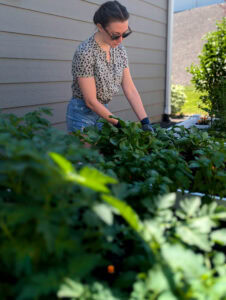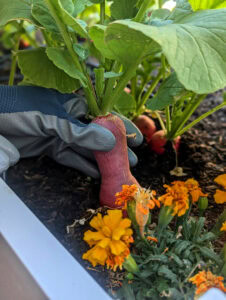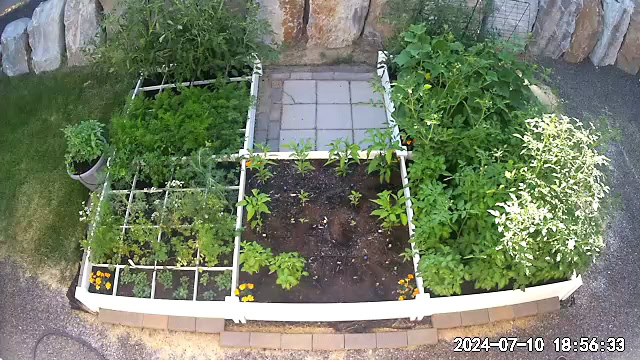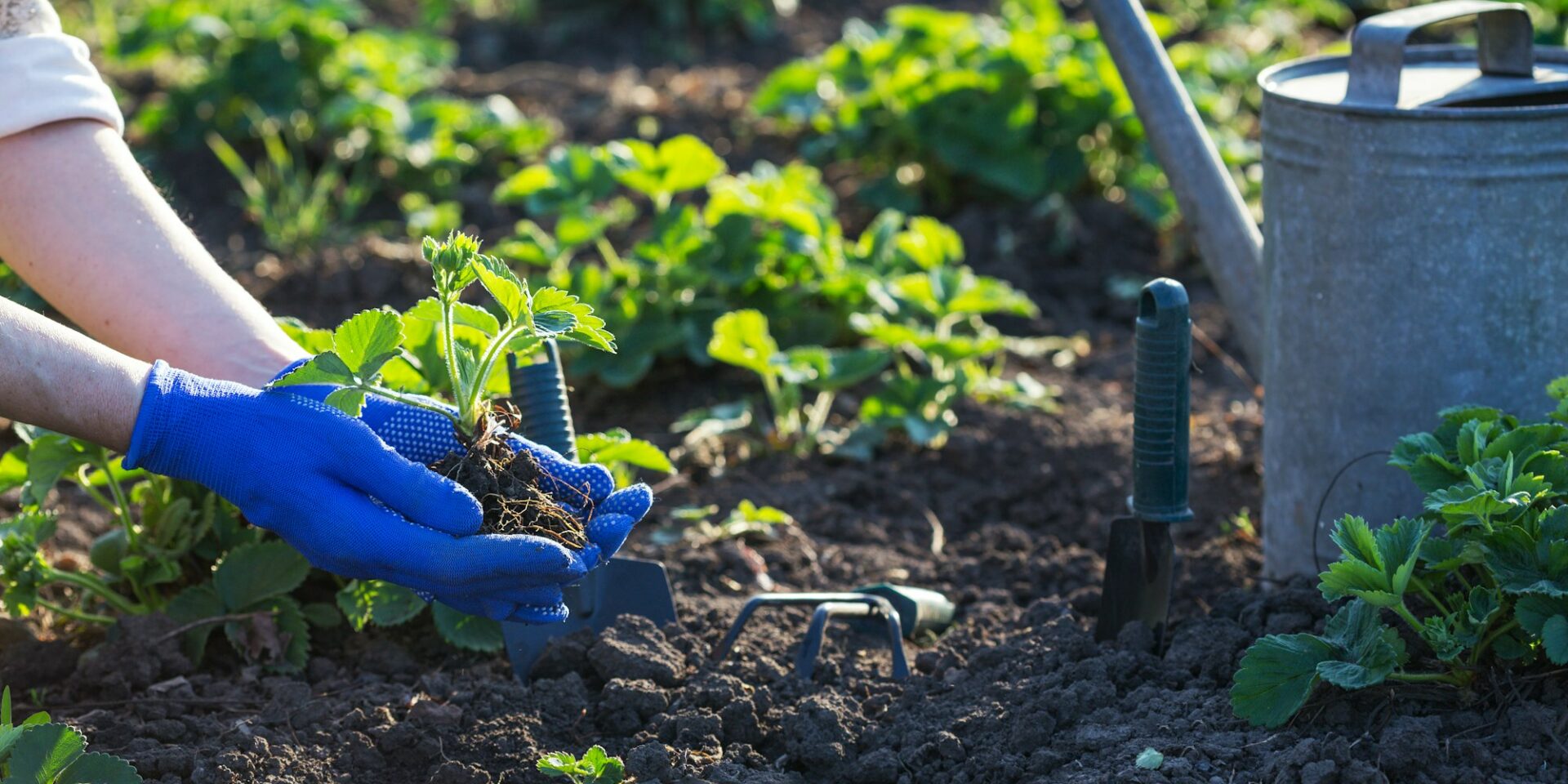
And How to Garden Organically
Gardening isn’t just a hobby; it’s a way of life that can improve your health, save you money, and help the environment. Starting a garden, especially an organic one in raised beds, has many benefits. In naturopathic medicine, one of the basic foundations of health is getting out into nature, and what better way is there than giving yourself a frequent hobby outside? Let’s dig into why you should consider it and how to get started.
Benefits of Gardening
1. Fresh and Healthy Food: When you grow your own veggies and fruits, you know exactly what goes into them. In the naturopathic approach to diet, plenty of natural fiber from organic produce is a foundation staple. No more worrying about harmful pesticides or chemicals because you control what you use to help your plants grow.
2. Exercise: Gardening gets you moving. Digging, planting, weeding, and watering are all physical activities that can contribute to a healthy lifestyle. Movement is one of the basic foundations of natural health, and this is a great low-impact option for those with mobility concerns. The extra vitamin D from being outside doesn’t hurt either!
3. Stress Relief: Spending time in nature and tending to plants can reduce stress. We know stress is related to 95% of modern illness in naturopathic medicine, so giving ourselves more ways to nurture our nervous system is important. Gardening is a rewarding activity that can be calming and can even lower blood pressure.
4. Save Money: Growing your own food can cut down on grocery bills. Seeds and plants are often cheaper than buying produce from the store, especially with how organic food prices are soaring.
5. Help the Environment: By avoiding chemical fertilizers and pesticides, you’re not contributing to water and soil pollution. Plus, plants are great for the air—they take in carbon dioxide and give off oxygen.
How to Start an Organic Garden in Raised Beds
Step 1: Build or Buy Your Raised Beds
You can make raised beds from wood, bricks, or even cinder blocks. The idea is to create a contained space filled with soil. This makes it easier to manage your garden and keeps it separate from the rest of your yard. Plus, the soil in the Treasure Valley is very challenging to work with, raised beds can help keep watering more consistent.
Step 2: Choose the Right Location
Your raised bed should be in a spot that gets plenty of sunlight—at least six hours a day. Also, make sure it’s close to a water source so you can easily water your plants. You can also route a line directly to your new plants if you want a more automated set up.
Step 3: Place Wiring Down
As moles, gophers and mice are common in Boise and Meridian, placing protective wiring, such as chicken wire, underneath your raised beds can help protect your produce from these potential invaders.
Step 4: Fill Your Beds with Good Soil
Use a mix of compost, topsoil, and other organic materials. This will give your plants the nutrients they need without using chemical fertilizers.
Step 5: Pick Your Plants
Choose vegetables and fruits that you like to eat and that will grow well in your area. Think about planting herbs too—they’re easy to grow and can add lots of flavor to your meals.

Here’s the organic produce I planted in my garden this year:
Tomato
- Rich in vitamins C, K, potassium, and folate.
- High in antioxidants like lycopene, which may reduce heart disease and cancer risk.
- Contains beta-carotene for vision and immune function.
Radish
- Low in calories, high in vitamin C, folate, and potassium.
- Contains glucosinolates and isothiocyanates with potential anti-cancer properties.
- High fiber content aids digestion.
Carrot
- High in beta-carotene (vitamin A), beneficial for vision and immune health.
- Good source of fiber, potassium, and antioxidants.
- Contains lutein and zeaxanthin for eye health.
Cucumber
- High water content for hydration.
- Contains vitamins K and C, potassium, and magnesium.
- Antioxidants like beta-carotene and flavonoids combat inflammation.
Chives
- Rich in vitamins A, C, K, folate, and essential minerals.
- Contains antioxidants like flavonoids.
- Mild anti-inflammatory and antimicrobial properties.
Jalapeño
- Contains capsaicin for metabolism-boosting and pain relief.
- Rich in vitamins C and A, with antioxidant benefits.
Basil
- Contains essential oils with anti-inflammatory and antimicrobial properties.
- Rich in antioxidants like beta-carotene and flavonoids.
- Supports stress relief and digestive health.
Oregano
- Antimicrobial properties due to thymol and carvacrol.
- Rich in antioxidants and vitamin K.
- Supports respiratory health and muscle recovery.
Thyme
- Contains thymol with antiseptic and anti-inflammatory properties.
- Rich in vitamins A and C for immune support.
- Promotes digestive health and reduces blood pressure.

Cilantro
- Good source of vitamins A, C, and K.
- Anti-inflammatory and antimicrobial properties.
- Aids digestion, reduces anxiety, and may detoxify heavy metals.
Parsley
- High in vitamins A, C, and K for eye, immune, and bone health.
- Contains antioxidants like flavonoids and volatile oils.
- Supports bone health and has antibacterial properties.
Step 6: Plant and Maintain Your Garden
Follow the instructions for each plant type regarding spacing and depth. Water regularly, but don’t overdo it.
Beginner tips:
- Some plants are better to direct sow while others should be seed started.
- Don’t forget to harden your seedlings if you seed start!
- Use mulch to keep weeds at bay and retain moisture.
Step 7: Avoid Chemicals
Instead of using chemical pesticides, attract beneficial insects like ladybugs or use natural remedies like neem oil. Other natural means of pest control can be marigold flowers planted at the edges and using cedar based mulch or oils. You can also purchase non-toxic leaf spray that is non-toxic and safe for human consumption. Rotate your crops each year to prevent disease and keep the soil healthy.
Step 8: Enjoy the Harvest
When your plants start producing, enjoy the fruits (and vegetables) of your labor! Remember to pick your produce when it’s ripe to encourage more growth. You can also get creative with keeping your produce for months to come, especially with canning and pickling.
Starting a garden, particularly an organic one in raised beds, is beyond rewarding. It’s good for you, your wallet, and the planet. So, grab some gloves and get gardening!





